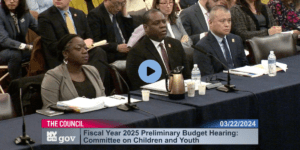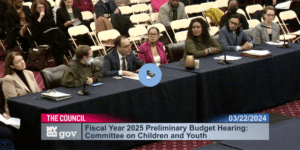March 22, 2024
As our FY25 preliminary budget hearing coverage continues, this week we look at the Committee on Children and Youth, which met on March 22 and its focus on testimony from the Department of Youth and Community Development (DYCD).
Overall, DYCD’s budget request for Fiscal Year 2025 is $1.1 billion. This figure is $205.4 million less than the FY24 Current Budget, following in-year adjustments, and $234.5 million less than the FY24 Adopted Budget. $877 million of DYCD’s budget (77.7 percent) is City Tax Levy funding, with most of the rest either intercity transfers ($141 million, or 12.5 percent) or federal funds ($99 million, or 9 percent). DYCD’s budgeted headcount for FY25 is 553, an increase of six positions from the FY24 Adopted Budget.
DYCD Commissioner Keith Howard shared an overview of his agency’s accomplishments over the past year including:
- A look back at last year’s Summer Youth Employment Program (SYEP). Celebrating its 60th anniversary in 2023, SYEP supported approximately 100,000 participants with short-term jobs and other paid work-based learning experiences across more than 17,000 work sites.
- SYEP served approximately 11,500 youth with barriers to employment, including disabilities, homelessness, and justice system involvement. Nearly 16,000 youth were from communities at high risk of gun violence, 13,000+ were NYCHA residents, and 20,000+ were part of the CareerReady SYEP partnership with NYC Public Schools.
- The Work Learn & Grow program, a school-year complement to SYEP, served over 7,000 high school students in Fiscal Year 2024.
Howard highlighted that DYCD intends to serve 100,000 SYEP participants again in summer 2024, as well as 110,000 elementary and middle school students through the Summer Rising program and discussed DYCD’s absorption of the Office of Neighborhood Safety.
Committee Chair Althea Stevens (D-Bronx), a former nonprofit executive with deep expertise in youth services, focused her questioning on the justification for and potential impact of proposed cuts, including to services within Summer Rising and the Preventative Employment Initiative. Commissioner Howard and his team repeatedly referenced the pressures on the city’s budget in the face of the ongoing asylum seeker crisis. When asked about the grounds on which they based decisions to cut programs, the DYCD team cited the priority of not impacting what they considered to be core services while taking into account underutilization of services and other considerations.
The Chair expressed criticism regarding the Saturday Night Lights program—which she sees as insufficiently rigorous from a youth development perspective—and the service reduction to Summer Rising that includes the elimination of programming on Fridays.
Council Members Rita Joseph, Linda Lee, and others, related to adult literacy, a category that includes adult basic education, high school equivalency instruction, and ESL training. Members’ concerns ranged from the per-participant rate of $1,300—less than half the $2,700 per learner that Council had requested—to the methodology of how DYCD targeted neighborhoods, and whether and how NYCHA residents could access adult literacy services.
In public testimony following the administration panel (as well as the budget hearing for the Administration for Children’s Services, testifying before the same committee), advocates raised many of the same concerns.
- Ira Yankwitt, executive director of the Literary Assistance Center (an NYCETC member), testified that the 16,000 New Yorkers DYCD claimed to serve through adult literacy programs represented less than 1 percent of the estimated 2.2 million NYC residents who need basic education or English language programs.
You can watch a recording of the full hearing here — community testimony begins 5 hours into the recording, and includes testimony from NYCETC members: United Neighborhood Houses, NMIC, The Door, Lehman College, Chinese-American Planning Council, exalt and Urban Dove.
Further Reading
City Council analysis of DYCD FY25 budget request
Summer Rising service reductions
A conversation with Ira Yankwitt (Literacy Assistance Center)


